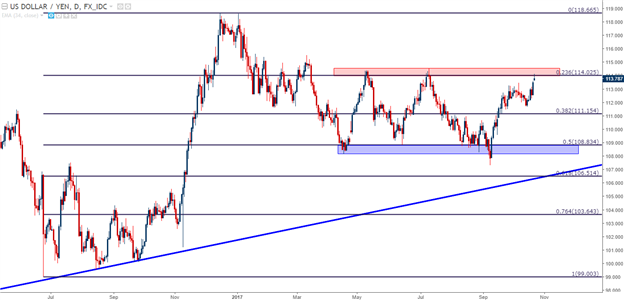This week brings a pair of highly-important Central Bank rate decisions, and the weekend brought another dose of political-fed volatility. In Japan, PM Shinzo Abe enjoyed a rousing victory as his Liberal Democratic Party and its coalition partner took more than 2/3rds of the vote, affording Mr. Abe a strong new mandate. This should allow him to drive for the first changes to Japan’s pacifist constitution since it was introduced in 1947 after World War II.
While a similar gambit in the U.K. blew up with dire consequences, Mr. Abe called for early general elections in an effort to use a surge in poll numbers to take advantage of a weakened opposition party. Worries populated when shortly after the announcement of those early general elections, popular Tokyo governor Yuriko Koike announced that she was creating a new party, ‘The Party of Hope.’ But after this weekend’s decisive win for Mr. Abe and the LDP, those concerns of a weaker base for Mr. Abe have begun to dissipate. The immediate response upon market open was a jump-higher in the Nikkei along with another run of weakness in the Japanese Yen. In USD/JPY, the pair is now testing an area of resistance that’s held the highs in the pair for a large portion of the year.
USD/JPY Daily: Gap-Up to Resistance, Testing Seven-Month Highs

Chart prepared by James Stanley
With a strong dose of political risk now out of the way, and with Japanese voters having given Mr. Abe and the LDP another vote of confidence – we could see Yen weakness continue under the presumption that the BoJ will continue with their uber-dovish stance until inflation starts to show at a stronger rate. In August, we saw this number come-in at .7%, and this was after four consecutive months at .4%. We’re still quite a ways away from the 2% BoJ target, and that continued lag is what opens the backdrop for further easing from the BoJ.
Thursday brings September inflation for Japan. The expectation is for a flat print at .7%, just as we saw in August. Weaker reads will likely bring on Yen-weakness while stronger prints will probably bring a dash of strength. The big question, in that scenario, is for how long that strength might last and when Yen bears might come back to push the trend-lower?













Leave A Comment